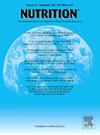The roles of vitamin C in infectious diseases: A comprehensive review
IF 3.2
3区 医学
Q2 NUTRITION & DIETETICS
引用次数: 0
Abstract
Vitamin C is a versatile nutrient with essential antioxidant properties and roles in amino acid metabolism, collagen promotion, and hormone synthesis. It has long been regarded as benefitting infectious disease management, although its specific roles remain uncertain. The dominant view is that this efficacy not only stems from its redox regulation in the body but also from its profound impact on the immune system. This review provides a comprehensive overview of Vitamin C's effects on redox regulation and shows how the vitamin influences various immune cells and cell-intrinsic innate immunity signaling pathways, thereby updating and expanding our previous perspectives. Clinically, though some studies and case series have suggested potential benefits of Vitamin C in preventing and (or) treating respiratory tract infections and sepsis and septic shock, the evidence remains controversial. The current data is insufficient to support the routine clinical use of Vitamin C in managing these diseases and requires further rigorous evaluation to establish definitive efficacy and safety profiles. This review thoroughly examines current clinical research progress on Vitamin C, summarizes the primary controversies and their underlying causes, and proposes directions for future clinical research. Furthermore, preclinical evidence shows potential roles for Vitamin C in the supplementary treatment of the “Big Three” infectious diseases: acquired immunodeficiency syndrome (AIDS), tuberculosis, and malaria; however, systematic clinical studies in these areas are lacking. We examine related in vitro and animal studies, as well as clinical trials, and discuss potential roles for Vitamin C as a treatment and (or) adjuvant therapy.

求助全文
约1分钟内获得全文
求助全文
来源期刊

Nutrition
医学-营养学
CiteScore
7.80
自引率
2.30%
发文量
300
审稿时长
60 days
期刊介绍:
Nutrition has an open access mirror journal Nutrition: X, sharing the same aims and scope, editorial team, submission system and rigorous peer review.
Founded by Michael M. Meguid in the early 1980''s, Nutrition presents advances in nutrition research and science, informs its readers on new and advancing technologies and data in clinical nutrition practice, encourages the application of outcomes research and meta-analyses to problems in patient-related nutrition; and seeks to help clarify and set the research, policy and practice agenda for nutrition science to enhance human well-being in the years ahead.
 求助内容:
求助内容: 应助结果提醒方式:
应助结果提醒方式:


